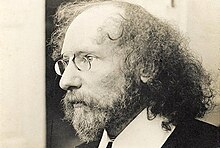Vyacheslav Ivanov | |
|---|---|
 Ivanov in 1900 | |
| Born | Vyacheslav Ivanovich Ivanov 28 February 1866 Moscow, Russian Empire |
| Died | 16 July 1949 (aged 83) Rome, Italy |
| Occupation | poet and playwright |
| Nationality | Russian |
| Alma mater | Moscow State University, Berlin University |
Vyacheslav Ivanovich Ivanov (Russian: Вячесла́в Ива́нович Ива́нов, Italian: Venceslao Ivanov; 28 February [O.S. 16 February] 1866 – 16 July 1949) was a Russian poet, playwright, Classicist, and senior literary and dramatic theorist of the Russian Symbolist movement. He was also a philosopher, translator, and literary critic.
Born into the lower Russian nobility, the multilingual Ivanov studied Classics, philology, and philosophy. He married the sister of a school friend and aspired to live as a conventional family man, until he discovered the philosophy of Friedrich Nietzsche while in Rome. Following a surrender to their mutual attraction one night in the Colosseum, Ivanov left his wife and daughter for married Afro-Russian poet Lydia Zinovieva-Annibal. Following their Orthodox ecclesiastical divorces and clandestine remarriage in a Greek Orthodox ceremony at Livorno, Ivanov and Zinovieva-Annibal returned to their homeland and plunged headfirst into Tsarist Russia's literary bohemia.
For most of the remaining years of the Pre-1917 Silver Age of Russian Poetry, Ivanov presided over a weekly literary salon near the Tauride Palace in St. Petersburg. He helped discover the poet Anna Akhmatova and served as a highly influential teacher and mentor to philosopher Nikolai Berdyaev, Symbolist poet and future Russian Orthodox martyr Maria Skobtsova, and Nobel Prize-winning poet and novelist Boris Pasternak.
Similarly to his contemporaries Hugo von Hoffmannsthal and Max Reinhardt in the Germanosphere, Ivanov was a hugely influential avant garde dramatic theorist and sought, under the influence of Ancient Greek, Medieval, and Spanish Golden Age theatre, to blur and even to erase the fourth wall and make the audience into participants in the dramas they attended. The radically innovative theatre director Vsevolod Meyerhold is only one of those who has been enormously influenced by Ivanov's dramatic philosophy.
Following the First World War, the October Revolution, the Russian Civil War, and his 1924 emigration from the Soviet Union to Fascist Italy, Ivanov converted in 1926 to the Russian Greek Catholic Church, which remains one of the smallest of the Eastern Catholic Churches. Ivanov had previously lived a life so hedonistic that he later compared his conversion in a work of Russian poetry to that of St. Augustine.
In 1931, Ivanov successfully defended Christianity in a public debate against Benedetto Croce, which enormously bolstered his intellectual reputation in the West. Ivanov spent the remainder of his life in Rome as a professor at both the Pontifical Oriental Institute and the Russicum, where his students included future Martyrs and confessors under Stalinism Bishop Theodore Romzha, Fr. Pietro Leoni, and Fr. Walter Ciszek. His close friends as a refugee included Martin Buber, Sir Isaiah Berlin, Sir Maurice Bowra, and Charles Du Bos.
Since his death in 1949, Ivanov's writing has been praised and referenced by Pope John Paul II, who often referenced Ivanov's metaphor about Roman and Byzantine Christianity representing the two lungs of Christendom. Furthermore, after decades of his writings being banned by government censorship in his homeland, Ivanov has witnessed a great revival of interest since the collapse of the Soviet Union in 1991.